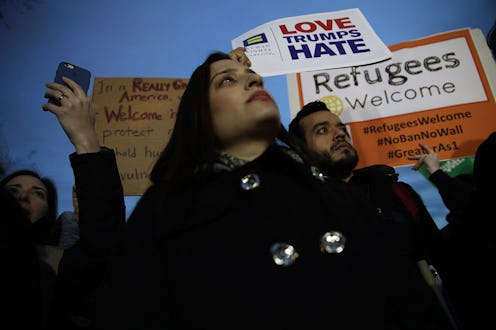
In spite of the revisions made to Donald Trump's travel ban on Monday, the updated order is said to be identical in nature to its previous form. In fact, White House advisor Stephen Miller admitted the revised travel ban was effectively identical to its predecessor. In his own words, "[T]hese are mostly minor, technical differences. Fundamentally, you are still going to have the same, basic policy outcome for the country." In essence, this suggests the revised travel ban is rooted in the anti-Muslim sentiment as the original executive immigration order.
While some insist the ban carries no religious discriminatory nature, Wajahat Ali, creative director of Affinis Labs, an enterprise for social entrepreneurship and innovation, and co-author of Fear, Inc. The Roots of the Islamophobia Network in America, differs.
Ali tells Bustle, "The reason why we know it's a Muslim ban is because Trump branded his campaign on a few major platform promises. One of them was a permanent Muslim ban, which then he said would be a temporary Muslim ban. He furthermore stated that he would be open to the extreme vetting of Muslims."
The revised order now exempts Iraq from the list as well as lawful permanent residents and people carrying visas, reducing the list to six Muslim-majority countries: Iran, Libya, Sudan, Somalia, Syria and Yemen. The revised version of Trump's travel ban will take effect on March 16, 10 days from its signing.
Activists centered on immigration rights and safety have issued condemnations against the revised order. The American Civil Liberties Union has announced that it will challenge the new order, which many say targets Muslims specifically. In a tweet from the ACLU's official account, it stated, "freedom of religion is enshrined in our Constitution and this new ban is still unconstitutional." In a statement attributed to Omar Jadwat, director of the ACLU's Immigrant Rights Project, the travel ban is said to have the "same fatal flaws."
In a tweet from his official account, Rep. Adam Schiff from California said the "real target is not security but faith."
And Trump's anti-Muslim rhetoric reaches back months and months. In December, 2015, Trump called for a "total and complete shutdown of Muslims" entering the United States, indirectly pointing at Muslim immigrants as carriers of anti-American sentiment. He claimed, by citing a poll from the Center for Security Policy, that "large segments of the Muslim population" harbor "great hatred" for America. Trump's controversial statement on Muslims, which elicited criticism from Democrats and immigration rights activists, is still up on his website.
In February 2017, an internal memo obtained by the AP from the Department of Homeland Security contradicted Trump's claim and assessed that the country of citizenship is "unlikely to be a reliable indicator of potential terrorist activity."
The ban is also ineffective in addressing national security concerns, according to Ali. "The number one recruitment propaganda of our enemies abroad is [saying] the West is at war with Islam." Ali says the nature of the ban essentially remains the same as it still operates on the grounds of "paranoia and fear-mongering." Keeping hope alive though, Ali believes that the ban won't stay for long.
The ban will still fail constitutional muster under equal protection. You can argue that it will also fail under the Immigration and Nationality Act of 1965 which bars discrimination against individuals based on their nationality. It's ineffective, counterproductive and cruel.
Cato Institute's recent study concluded that people from the targeted countries "have killed zero Americans in terrorist attacks on U.S. soil between 1975 and the end of 2015," further stating that the measures taken in the ban will have "no effect on improving national security."
With 10 days left for the order to become effective, it is clear that removal of one country and, as Miller himself put it, "minor differences" still do not change the anti-immigrant and anti-Muslim essence of the Trump's travel ban.